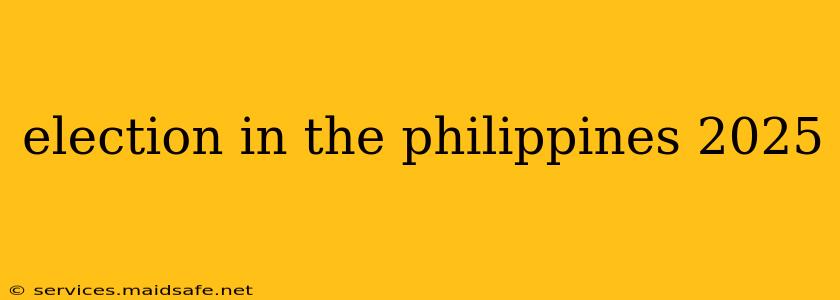The Philippines is gearing up for another national election in 2025, a pivotal moment that will shape the country's political landscape for years to come. This election will be crucial in determining the direction of the nation, particularly concerning its economic development, social reforms, and foreign policy. Understanding the key factors influencing this election is vital for both Filipino citizens and international observers.
Key Players and Potential Candidates
While it's still early, speculation about potential candidates is already rife. The 2025 election will likely see a diverse range of contenders, encompassing figures from established political dynasties, rising stars, and perhaps even surprising independent candidates. Analyzing the strengths and weaknesses of potential candidates will be crucial to predicting the election's outcome. Key factors to consider include their political experience, public image, and their platforms addressing key national issues.
Political Parties and Coalitions
The role of political parties and their potential alliances will be significant. Existing power structures and the formation of new coalitions will heavily influence the election campaign. Analyzing the evolving dynamics within these parties and their potential strategies will provide valuable insight into the election's trajectory. The strength and organization of these parties will play a critical role in mobilizing voters and securing victory.
Major Issues Shaping the 2025 Election
Several key issues are expected to dominate the 2025 election campaign. Understanding these issues and how candidates address them will be crucial for voters to make informed decisions.
Economic Development and Inequality:
The persistent issue of economic inequality and the need for sustainable economic growth will undoubtedly be central to the election debate. Candidates will likely present varying approaches to addressing poverty, unemployment, and improving the lives of ordinary Filipinos. Focus will be on job creation, infrastructure development, and policies aimed at reducing the wealth gap.
Social Issues and Reforms:
Social issues, including healthcare, education, and environmental protection, are expected to receive significant attention. Candidates will likely present different plans for improving access to quality healthcare and education, and for tackling environmental challenges such as climate change. The debate will likely involve discussions about social justice, human rights, and the role of the government in protecting vulnerable populations.
Foreign Policy and International Relations:
The Philippines' foreign policy and its relationship with other countries, particularly the United States and China, will be another significant area of discussion. Candidates will likely outline their stances on key foreign policy issues, including regional security, trade, and international cooperation. Voters will need to understand the implications of different foreign policy approaches for the Philippines' national interests.
The Role of Media and Social Media
The media, both traditional and social, will play a crucial role in shaping public opinion and influencing the election outcome. Analyzing media coverage, identifying potential biases, and understanding the spread of misinformation will be essential in assessing the election's fairness and transparency. The impact of social media on voter engagement and the dissemination of political messages will also need careful consideration.
Preparing for the 2025 Election
The 2025 Philippine election will be a complex and consequential event. Staying informed about the candidates, their platforms, and the key issues shaping the election is crucial for Filipino citizens to participate meaningfully in the democratic process. A thorough understanding of the election landscape will allow for better informed decisions and ultimately help shape the future of the Philippines. Engaging in informed discussions, participating in voter education programs, and exercising the right to vote are essential for a healthy democracy.

